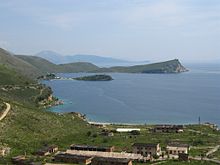Porto Palermo Castle
| Porto Palermo Castle | |
|---|---|
Kalaja e Porto Palermos | |
| Himarë, Albania | |
 Porto Palermo Castle | |
| Coordinates | 40°03′44″N 19°47′26″E / 40.062317°N 19.790475°E |
| Site information | |
| Owner | |
| Controlled by | Chaonians (Epirus) Despotate of Epirus |
| Open to the public | Yes |
| Site history | |
| Built | 5th Century BC |
| Built by | final form created by Ali Pasha of Tepelena |
| Kep i Palermos Lighthouse | |
 | |
| Foundation | stone base |
| Construction | stone tower |
| Height | 10 m (33 ft) |
| Shape | irregular octagonal tower with balcony and light atop[1][2] |
| Markings | unpainted (tower) |
| Power source | solar power |
| Focal height | 113 m (371 ft) |
| Range | 8 nmi (15 km; 9.2 mi) |
| Characteristic | Fl W 8s |

Porto Palermo Castle (Albanian: Kalaja e Porto Palermos) is a castle near Himarë in southern Albania. It is situated in the bay of Porto Palermo, a few kilometers south of Himarë along the Albanian Riviera. The area together with Llamani beach will be proclaimed a protected area holding the status of Protected Landscape by the Albanian Government.[3] It is the most well preserved garrison erected by Ali Pasha in the region.[4]
History
[edit]This section needs expansion. You can help by adding to it. (June 2015) |
Due to its strategic position, the shores of Porto Palermo have been utilized for defensive purposes from antiquity to World War II.[5]
Porto Palermo Castle is a castle near Himara in southern Albania with an intriguing history. It is situated in the closed bay of Porto Palermo, a few kilometers south of Himarë, and makes nearly an island that is connected to the mainland by a narrow strip of land. The fort served as former Soviet submarine base during the communist regime in Albania, and nowadays its semi abandoned tunnel and barrack attract attention of visitors, as well as the stronghold walls and gates built by the powerful Ali Pasha of Ioannina.
The well preserved castle was built in the early 19th century by Ali Pasha of Tepelena.[6] In 1921 the castle was called Venetian.[7] In 1803 Ali Pasha offered the castle and port to the Royal Navy. At which time the fort only had 4 or 5 cannon implying that Ali Pasha did not see the fort as important for him.[8] William Martin Leake visited the fort and noted that the garrison consisted of 10 men with two four-pounders.[9] François Pouqueville in 1806 reports, "The tower or fort stands on the southern point of the entrance, connected with the continent by a low narrow isthmus. It consists of a square with bastions, having a few guns, of no service either to command the entrance or to protect the shipping at anchor. Near it are some warehouses, a custom-house, and a Greek church."[10]
- Abandoned barracks at Porto Palermo
-
Abandoned building on Porto Palermo, contains former socialist message "Long live the albanian-chinese friendship" (RROFTE MIQESIA SHQIPTARO-KINEZE).
-
Abandoned building on Porto Palermo (side) with socialist message saying "Long live the Communist Party of China and comrade Mao Zedong" (RROFTE PK E KINES DHE SHOKUN MAO CE DUN)
-
Abandoned building on Porto Palermo, contains former socialist message "THE DECISIONS OF THE 6th Congress of the PLA WORK PROGRAM (...)" (VENDIMET E KONG. 6te PPSH PROGRAM PUNE (...))
Literature
[edit]The erection of the castle by Ali Pasha was praised by Greek poet and member of Ali Pasha's court, Ioannis Vilaras.[11]
See also
[edit]- List of castles in Albania
- List of lighthouses in Albania
- Tourism in Albania
- Albanian Riviera
- Geography of Albania
- Porto Palermo Tunnel
References
[edit]- ^ List of Lights, Pub. 113: The West Coasts of Europe and Africa, the Mediterranean Sea, Black Sea and Azovskoye More (Sea of Azov) (PDF). List of Lights. United States National Geospatial-Intelligence Agency. 2015.
- ^ Rowlett, Russ. "Lighthouses of Albania". The Lighthouse Directory. University of North Carolina at Chapel Hill. Retrieved 7 April 2017.
- ^ "Error - Akses i palejuar". Archived from the original on 2016-09-21. Retrieved 2015-07-26.
- ^ Σμύρης, Γεώργιος (2000). "Castle Network of the Pashalik of Ioannina" (in Greek). Εθνικό Μετσόβιο Πολυτεχνείο (ΕΜΠ). Σχολή Αρχιτεκτόνων Μηχανικών: 7. doi:10.12681/eadd/12426. hdl:10442/hedi/12426. Retrieved 13 September 2022.
{{cite journal}}: Cite journal requires|journal=(help) - ^ Neumeier, Mary (1 January 2016). The Architectural Transformation Of The Ottoman Provinces Under Tepedelenli Ali Pasha, 1788-1822. Publicly Accessible Penn Dissertations (Thesis). p. 103. Retrieved 13 September 2022.
- ^ Ndarurinze, Renate (2008). Albanien entdecken: Auf den Spuren Skanderbegs (in German). Berlin: Trescher Verlag. p. 243. ISBN 978-3-89794-125-0.
- ^ Scriven, George P. (April 1921). "Some Highways of Albania and a Forgotten Riviera". Geographical Review. 11 (2). American Geographical Society: 198–206. doi:10.2307/207325. JSTOR 207325.
- ^ p 86 J. W. BAGGALLY 1938 Ali Pasha and Great Britain Basil Blackwell: Oxford
- ^ "1804 | William Martin Leake: Travels in Southern Albania". Archived from the original on 2015-10-06. Retrieved 2015-10-06.
- ^ "1806 | François Pouqueville: Travels in Epirus and Albania". Archived from the original on 2016-03-04. Retrieved 2015-10-06.
- ^ Kyriazis, Doris; Qirjazi, Dhori Q. (2016). "Vepra në gjuhën greke për Shqipërinë dhe shqiptarët, shkruar prej grekësh dhe shqiptarësh. Vështrim i përgjithshëm". "Letrat shqipe dhe gjuhët e tjera të letërsisë shqiptare". Konferencën Ndërkombëtare e Albanian Academy of Sciences (Tiranë, nëntor 2015: 25. Retrieved 13 September 2022.




